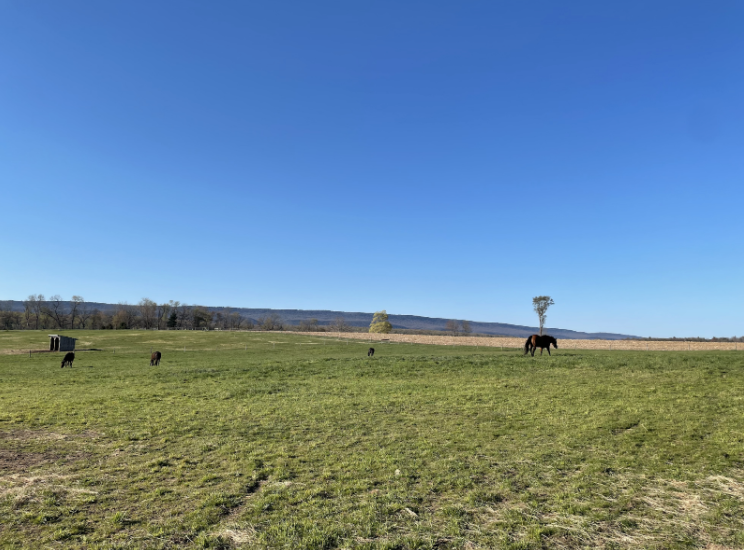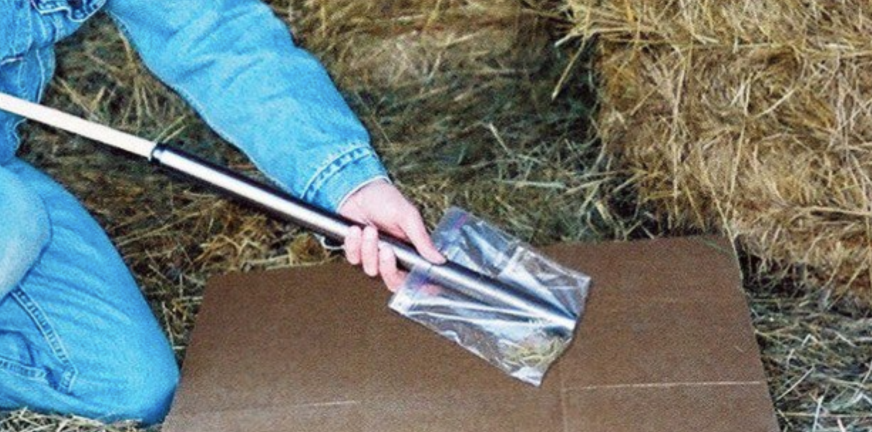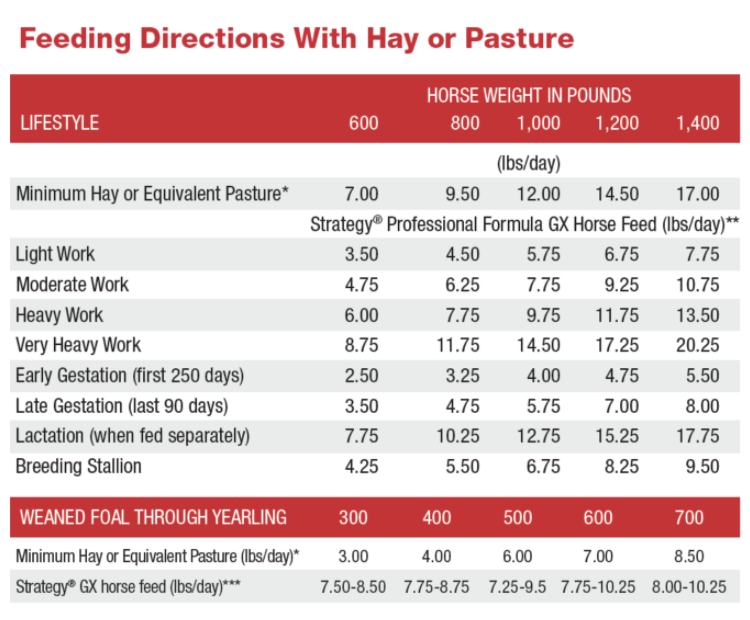
Best of JN: Finding a Nutrition Plan That Works for Your Horse
“While diving into the ins and outs of equine nutrition in a way I hadn’t before was intimidating, recognizing the numerous tools created to assist in identifying necessary management techniques and changes to nutrition programs was incredible.”
Growing up around horses, I quickly learned the basics of equine nutrition, including the importance of a forage-focused diet, extended periods of consumption, and access to salt or mineral blocks as well as to fresh water. For years I continued to seek out diet plans at boarding facilities that followed these same basic structures.
 I’ve been so lucky to board at farms that prioritize horse nutrition, where analyzing the types of grasses and hays fed to the horses is done frequently. Photo by Gillian Warner.
I’ve been so lucky to board at farms that prioritize horse nutrition, where analyzing the types of grasses and hays fed to the horses is done frequently. Photo by Gillian Warner.
Then my horse was diagnosed with pituitary pars intermedia dysfunction (PPID), or Equine Cushing’s Disease, and my obsession to find the right diet for her grew. After consulting with Natalie Sullivan of On Course Equine Nutrition, I worked through my previous nutrition plan to recreate a diet even better suited for my horse and her changing needs.
Even if your horse doesn’t have a metabolic issue, it’s important to take a close look at their diet. I asked Natalie about why it’s important to focus on nutrition. “Having a balanced and effective nutrition plan for your horse is important because it is the only thing you do every single day for your horse’s health. Every choice you make matters,” Natalie says. “It’s very easy to get overwhelmed with the plethora of product marketing and opinions out there, so it’s important to strip all that away and really get to know your horse’s primary forage and the ingredients inside each feed or supplement. It’s also important to consider your own individual needs and priorities.”
Of course, every horse is an individual with variation in their specific needs with different factors to consider. However, examining the forage, concentrate, and supplement make-up of your individual horse’s diet will assist you in determining the best course of management for your partner.
First off, as I learned from a young age, forage is critical for horses! However, forage with a nutrient content that is right for your horse is even more critical. “Your horse is likely eating 90-99% of their daily intake from hay. Your forage choices are more important than you realize. Not only can better forage choices make healthier horses, but they can also prevent problems before they happen,” Natalie stresses.
 Conducting a forage analysis will provide information on your horse’s diet to make decisions regarding their management. Photo by Penn State Extension
Conducting a forage analysis will provide information on your horse’s diet to make decisions regarding their management. Photo by Penn State Extension
Understanding the bulk of your horse’s diet is a great starting place for identifying the “right” diet, as the majority of their diet relies on forage. Through a forage analysis, you can learn more about the strengths and weaknesses of your forage, including levels of important proteins, vitamins, and minerals your horse needs. “There are three steps to a forage test; 1) really good representative sampling, 2) finding the right forage testing laboratory, and 3) interpreting the results. The most important step is #1- so take your time here. Use a nutritionist and/or your local county extension agency (your tax dollars pay for this resource) to help you with one or more of those three steps. Local county extension agents are some of the most underutilized professionals for horse owners” Natalie suggests.
From a foundation of forage analysis, you can turn to what else is needed to ensure a nutritious diet.
Concentrates should be used to supplement your horse’s diet in order to meet their nutritional needs. “The ONLY SINGLE reason to feed a concentrate is to provide what your hay or pasture can not or will not! Know your forage first, then you know what you need to supplement. Keep it simple. Keep it purposeful,” Natalie reminds us.
As my mare has always been an “easy keeper”, more often than not, her concentrate feeding would include essentially a handful of the lowest sugar/starch feed at the farm. However, this fell short for a number of reasons. Not only was this adding unnecessary calories to her diet, but they provided little, if any, nutritional value. Without feeding the recommended amount of feed, my horse was gaining weight without receiving enough vitamins and minerals for proper function. This situation is a perfect example of Natalie’s key piece of advice: “If I could teach every horse owner just one thing, I would tell them about the feeding directions on a feed label. Once you understand what to look for, you can predict the purpose of the product, the type of product, the amount of research on the ingredients, and so much more!” From this experience, I’ve grown to be increasingly purposeful in the choices I make for my horse’s diet.
 Utilize the feed labels and feeding directions to make sure the purpose of the product is in line with what you need. Photo from Bomgaars’ website.
Utilize the feed labels and feeding directions to make sure the purpose of the product is in line with what you need. Photo from Bomgaars’ website.
Beyond exploring your forage and concentrates, take a look at your additional supplements as well to find something that matches your “nutrition goals, budget, time or boarding constraints, and personal priorities of life,” as Natalie explains. Additionally, look for products that can guarantee safety, consistency or efficacy. Natalie wants feeds and supplements coming from “regulated manufacturing facilities with third party oversight, knowledgeable representatives, formulators that have scientific backgrounds, and peer-reviewed research that confirms that it actually works.”
Throughout the process of analyzing my horse’s feeding program, I was able to understand the quality of the hay provided to her, ensuring it was a good match for her needs. From there, I was able to find the right ration balancer to meet the nutritional needs not met in her forage while still keeping her sugar, starch, and caloric intake low for her Cushing’s.
While diving into the ins and outs of equine nutrition in a way I hadn’t before was intimidating, recognizing the numerous tools created to assist in identifying necessary management techniques and changes to nutrition programs was incredible. Additionally, working through the steps of such an individualized approach to management (with the expertise and guidance from Natalie!) has given me the confidence to know that my horse is receiving the best nutrition for her. As each horse is different in their needs, working with a nutritionist or taking a closer look at the forage, concentrates, and supplements your horse receives can help construct a plan that works for your horse.





